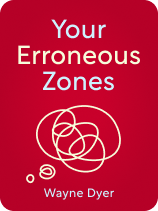

This article is an excerpt from the Shortform book guide to "Your Erroneous Zones" by Wayne Dyer. Shortform has the world's best summaries and analyses of books you should be reading.
Like this article? Sign up for a free trial here.
Why are people unhappy? What are erroneous zones and how do they prevent happiness?
Happiness may seem elusive, but Wayne W. Dyer asserts that you can choose to be happy at any moment, regardless of what’s happening around you. The problem is that you prevent yourself from being happy by allowing unproductive emotions to rule.
Continue reading to learn the psychology behind erroneous zones and their effect on people’s happiness.
Erroneous Zones Keep You From Being Happy
Why are people unhappy? Dyer argues that feelings aren’t passive occurrences; rather, they’re active reactions within your control. While anger, disappointment, or other emotions may seem valid, you should look at them through one lens: Do these emotions fulfill you or defeat you? (Shortform note: Dyer uses “feelings” and “emotions” interchangeably, but in How Emotions Are Made, neuroscientist Lisa Feldman Barrett contends they’re not the same thing: Feelings are internal sensations, while emotions are the concepts your brain assigns to the feelings to give them meaning and help you determine how to act.)
If the feelings defeat you by leading you to self-sabotaging behaviors—if they prevent you from taking action that leads to your growth and fulfillment—then Dyer says you’ve run into an erroneous zone. Some examples of erroneous zones are: needing to please other people, being unable to focus on the present, and procrastination.
(Shortform note: Similar to how our brains aren’t wired for happiness, we also have self-sabotaging tendencies that stem from traits that were useful in the past but are no longer needed today. In The Laws of Human Nature, Robert Greene writes that we self-sabotage because we’re irrational, bad at long-term thinking, and compulsive, and we have an inherent and unconscious sensitivity to particular stimuli.)
Why You Have Erroneous Zones
Dyer says that even though erroneous zones keep you from growing and becoming a better, happier person, you still hold onto them for two reasons: You derive some benefit from them, and you don’t love yourself enough.
You Benefit From Erroneous Zones
Dyer writes that you benefit from erroneous zones because they give you something or someone else to blame, allowing you to avoid accountability. They provide you with an excuse to stay where you are instead of taking risks and having to endure change, discomfort, or failure to find happiness.
For example, say you’re stuck in a job you don’t like. You might convince yourself it’s your parents’ fault for insisting that you get a degree in a field you’re not interested in, or you might blame your family for relying on you for financial support so you can’t quit your job. By assigning responsibility for your situation to someone else, you have an excuse to stay in the job rather than face the risks of resigning and finding a new job that you like.
(Shortform note: The tendency to blame someone or something else is what David J. Schwartz calls the “disease of excusitis.” In The Magic of Thinking Big, he writes that excuse-prone people typically blame their health, age, intelligence, or luck for things they can’t do. But Schwartz argues that successful people—those who aren’t plagued with the disease of excusitis—focus on what they can do, don’t let circumstances hold them back, and turn challenges into stepping stones for progress.)
Another benefit of holding onto your erroneous zones, says Dyer, is that you gain sympathy, concern, and even approval from others. For example, instead of breaking up with a partner who treats you badly, you might rehash every incident of poor treatment to your supportive friends. Staying in your situation gives you an audience who showers you with attention, comforts you, and maybe even compliments you for being strong enough to endure it all.
(Shortform note: Since the book was published in 1976, people have found new ways to try to gain sympathy and attention. One way they now do this is through “sadfishing”—baring deeply personal issues in social media posts. While some people may do this to genuinely highlight an important issue, such as mental health, some influencers have been called out for using the tactic to peddle products.)
You Don’t Love Yourself Enough
Dyer writes that the second reason you hold onto erroneous zones is a lack of self-love—you wallow in negative self-talk and don’t value yourself enough to do what you want. If you love yourself, Dyer argues, you’ll want to go after what you want rather than remain stagnant, which means breaking free from behaviors that hold you back from having a fuller, happier life.
(Shortform note: Leadership consultant John C. Maxwell agrees with Dyer that self-love is crucial for growth. In The 15 Invaluable Laws of Growth, Maxwell explains that self-love helps you see the value of investing in yourself. However, Maxwell notes that self-love isn’t enough—you also need self-knowledge, or an understanding of your values, passions, and capabilities. He writes that self-knowledge helps you grow by enabling you to set realistic goals and preventing you from wasting time on things that aren’t right for you. You can develop self-knowledge by reflecting on what you like to do, what you’re good at, and what captivates you.)

———End of Preview———
Like what you just read? Read the rest of the world's best book summary and analysis of Wayne Dyer's "Your Erroneous Zones" at Shortform.
Here's what you'll find in our full Your Erroneous Zones summary:
- How you're getting in the way of your own happiness
- The self-defeating practices that paralyze you and keep you from living a fulfilling life
- Why you hold on to your erroneous zones and how to eliminate them






